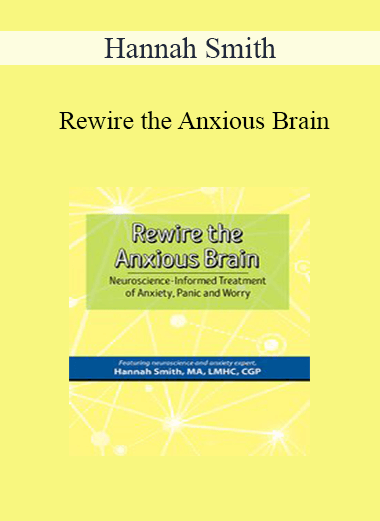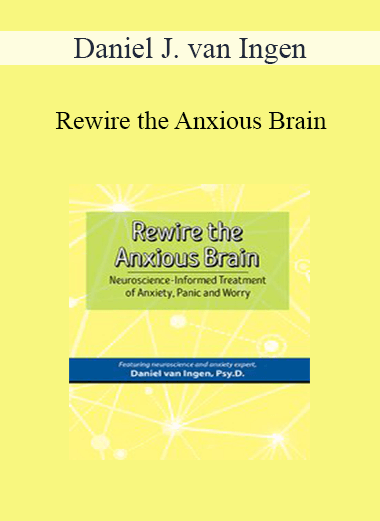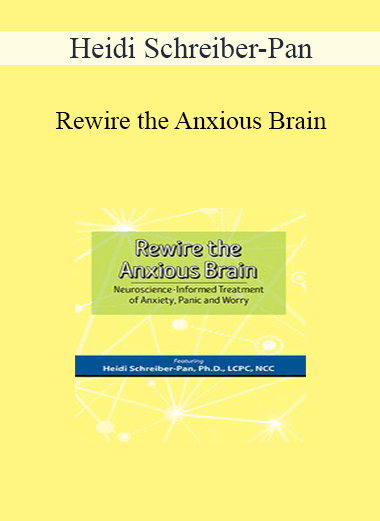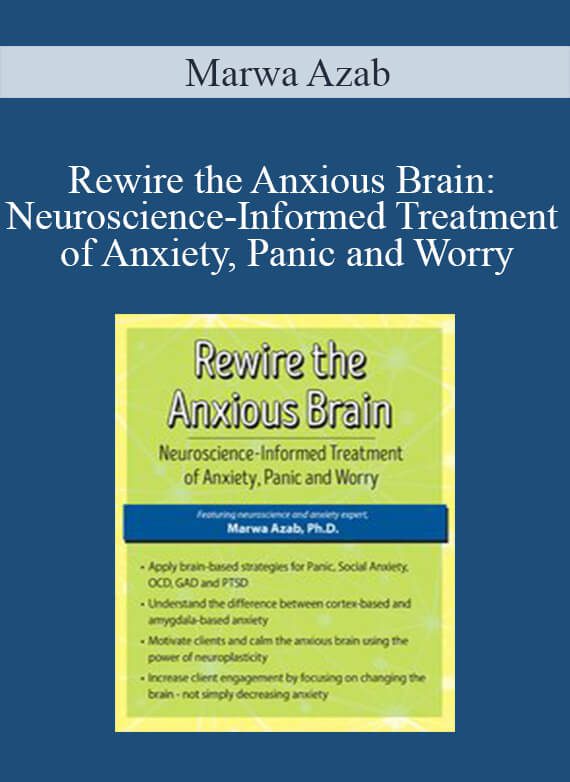[Download Now] Rewire the Anxious Brain: Neuroscience-Informed Treatment of Anxiety, Panic and Worry – Marwa Azab
$199.00 Original price was: $199.00.$50.00Current price is: $50.00.
[Download Now] Rewire the Anxious Brain: Neuroscience-Informed Treatment of Anxiety, Panic and Worry – Marwa Azab
Product Delivery: You will receive a download link via your order email immediately
Should you have any question, do not hesitate to contact us: [email protected]
[Download Now] Rewire the Anxious Brain: Neuroscience-Informed Treatment of Anxiety, Panic and Worry – Marwa Azab
Sale page_https://catalog.pesi.com/item/44974/
Archive: https://archive.fo/16QUT
Watch neuroscience and anxiety expert, Marwa Azab, Ph.D., and learn her keys for successful anxiety treatment. Dr. Azab integrates brain-based strategies for calming the anxious mind with client communication techniques that motivate change in your clients. Marwa’s approach promotes adherence to treatment and strengthens the therapeutic alliance – which is essential when working with anxious, worried, traumatized, or obsessive clients.
Dr. Azab will give you proven tools and techniques to:
- Identify and treat the roots of anxiety in both the amygdala and the cortex
- Explain “the language of the amygdala” in an accessible, straight forward way
- Identify how the cortex contributes to anxiety, and empower clients with strategies to resist anxiety-igniting cognitions
This transformational workshop recording will put the power of neuroplasticity to work for you and your anxious clients!
- Ascertain the underlying neurological processes that impact anxious symptoms for clients.
- Develop client engagement in treatment using personalized goals and attending to the therapeutic relationship.
- Evaluate the differences between amygdala-based and cortex-based anxiety symptoms and identify how these symptoms inform treatment interventions.
- Communicate strategies for calming and training the amygdala in order to alleviate symptoms of anxiety.
- Implement methods for teaching clients to retrain the cortex so that anxiety is resisted rather than exacerbated.
- Analyze how psychotropic medication impacts neuroplasticity in the brain; identify related treatment implications.
Use Neuroscience in the Treatment of Anxiety
- Positives: We know more about anxiety-based disorders than any other disorders
- Science gives explanations, evidence, authority, destigmatizes difficulties
- Concerns: It can be difficult to explain, answer questions
- Clients may feel a lack of responsibility
- Oversimplification is inevitable
Enhancing Engagement in Treatment
- Don’t neglect the therapeutic relationship!
- Address the challenges of anxious clients
- Remember that strategies are effortful
- Guide the process using client’s goals
- Maintain motivation
Neuroplasticity
- Define Neuroplasticity in everyday language
- Therapy is about creating a new self
- ”Rewiring” as an accessible concept for change
- Re-consolidation: the modification of emotional memories
Identify Two Neural Pathways to Anxiety
- Amygdala – bottom-up triggering of emotion, physicality of anxiety
- Cortex – top-down emotion generation based in cognition
- Explain the two pathways to clients
- How anxiety is initiated in each pathway and how pathways influence each other
Client Friendly Explanations
- Use illustrations to create concrete understanding
- Fight/flight/freeze responses
- The “language of the amygdala”
- Anxiety and the cortex
- Help clients recognize the two pathways to anxiety
Neuroplasticity in the Amygdala (Essential for all Anxiety Disorders, PTSD, OCD, Depression)
- Sleep and the amygdala
- The influence of exercise
- Breathing techniques to reduce activation
- Relaxation, meditation, and yoga to modify responses
- Exposure as opportunities for the amygdala to learn
- Combatting avoidance
- When anxiety indicates that the amygdala can learn new responses
- Push through anxiety to change the amygdala
Neuroplasticity in the Cortex (Essential for GAD, SAD, OCD, PTSD, Depression)
- ”Survival of the busiest” principle – strengthen or weaken specific circuitry
- The healthy (adaptive) use of worry in the cortex
- ”You can’t erase: You must replace.”
- Recognize and modify the impact of uncertainty
- Training correct uses of distraction
- Left hemisphere techniques – cognitive defusion, coping thoughts, fighting anticipation
- Right hemisphere techniques – imagery, music
- Mindfulness and anxiety resistances
Neuroplasticity and Medications for Anxiety Disorders, OCD, PTSD, Depression
- Medication’s effects in the rewiring process
- The myth of the chemical imbalance
- The danger of sedating the brain with benzodiazepines
- Promoting neuroplasticity with SSRIs, SNRIs
- The effectiveness of CBT and meds
Move Beyond Diagnostic Categories to Focus on Anxiety Pathways
- Anxiety is a component of many diagnoses (depression, substance abuse, etc.)
- Amygdala- and cortex-based techniques help in other disorders
- Targeting brain-based symptoms rather than disorders
- Worry, obsessions, rumination respond to similar cortex-based techniques
- Panic, phobic responses, and compulsions respond to amygdala-based techniques
Research, Risks and Limitations
- Empirical versus clinical and anecdotal evidence
- Clinical considerations for specific clients and settings
- Efficacy of particular interventions may vary
Tag: Rewire the Anxious Brain: Neuroscience-Informed Treatment of Anxiety, Panic and Worry – Marwa Azab Review. Rewire the Anxious Brain: Neuroscience-Informed Treatment of Anxiety, Panic and Worry – Marwa Azab download. Rewire the Anxious Brain: Neuroscience-Informed Treatment of Anxiety, Panic and Worry – Marwa Azab discount.
Delivery Method
– After your purchase, you’ll see a View your orders link which goes to the Downloads page. Here, you can download all the files associated with your order.
– Downloads are available once your payment is confirmed, we’ll also send you a download notification email separate from any transaction notification emails you receive from IMC.sale.
– Since it is a digital copy, our suggestion is to download and save it to your hard drive. In case the link is broken for any reason, please contact us and we will resend the new download link.
– If you cannot find the download link, please don’t worry about that. We will update and notify you as soon as possible at 8:00 AM – 8:00 PM (UTC+8).
Thank You For Shopping With Us!
Be the first to review “[Download Now] Rewire the Anxious Brain: Neuroscience-Informed Treatment of Anxiety, Panic and Worry – Marwa Azab” Cancel reply
Related Products
Medical & Health
Hannah Smith – Rewire the Anxious Brain: Neuroscience-Informed Treatment of Anxiety, Panic and Worry
Medical & Health
Medical & Health
Medical & Health
Marwa Azab – Rewire the Anxious Brain: Neuroscience-Informed Treatment of Anxiety, Panic and Worry
Medical & Health
Everything Else
Everything Else
Everything Else

![[Download Now] Jimmy Kelley - SEO Traffic Hospital](https://imc.sale/wp-content/uploads/2022/02/Jimmy-Kelley-SEO-Traffic-Hospital-imc-100x100.png)
![[Download Now] Jack Canfield and Deborah Sanadella - Awakening Power](https://imc.sale/wp-content/uploads/2022/02/4-4-3-100x100.png)
![[Download Now] Rewire the Anxious Brain: Neuroscience-Informed Treatment of Anxiety](https://imc.sale/wp-content/uploads/2022/02/054510.jpg)








![[Download Now] Rewire the Anxious Brain: Neuroscience-Informed Treatment of Anxiety](https://imc.sale/wp-content/uploads/2022/02/054510-100x100.jpg)
10 reviews for [Download Now] Rewire the Anxious Brain: Neuroscience-Informed Treatment of Anxiety, Panic and Worry – Marwa Azab
There are no reviews yet.